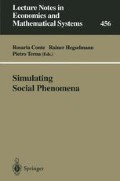Abstract
Advancing the state of the art of simulation in the social sciences requires appreciating the unique value of simulation as a third way of doing science, in contrast to both induction and deduction. This essay offers advice for doing simulation research, focusing on the programming of a simulation model, analyzing the results and sharing the results with others. Replicating other people’s simulations gets special emphasis, with examples of the procedures and difficulties involved in the process of replication. Finally, suggestions are offered for building of a community of social scientists who do simulation.
Access this chapter
Tax calculation will be finalised at checkout
Purchases are for personal use only
Preview
Unable to display preview. Download preview PDF.
References
Alvin, P., & Foley. D. (1992). Decentralized, dispersed exchange without an auctioneer. Journal of economic behavior and organization, 18, 27–51.
Axtell, R., Axelrod, R., Epstein, J. & Cohen, M. D. (1996). Aligning simulation models: a case study and results. Computational and mathematical organization theory, 1, 123–141.
Axelrod, R. (1987). The evolution of strategies in the iterated Prisoner’s Dilemma. In Genetic algorithms and simulated annealing, Lawrence Davis (ed.). London: Pitman; Los Altos, CA: Morgan Kaufman, 32–41.
Axelrod, R. (1997a). The dissemination of culture: a model with local convergence and global polarization. Journal of conflict resolution, 41, 203–26. Reprinted in Axelrod (1997b).
Axelrod, R. (1997b). The complexity of cooperation: agent-based models of competition and collaboration. Princeton, NJ: Princeton University Press.
Bratley, P., Fox, B. & Schrage, L. (1987). A Guide to Simulation. Second Edition. New York: Springer-Verlag.
Cohen, M. D., March, J. G., & Olsen, J. (1972). A garbage can theory of organizational choice. Administrative science quarterly, 17, 1–25.
Cyert, R. and March, J. G. (1963). A behavioral theory of the firm. Englewood Cliffs, N. J., Prentice-Hall, 1963.
Epstein, J. & Axtell, R. (1996). Growing artificial societies: social science from the bottom up. Washington, DC: Brookings and Cambridge, MA: MIT Press.
Kauffman, S., Macready, W. G., & Dickinson, E. (1994). Divide to coordinate: coevolutionary problem solving. Santa Fe Institute Working Paper, 94–06031.
Kauffman, S., (1995). At home in the universe. Oxford and New York: Oxford University Press. See especially 252–64.
March, J. G., (1978). Bounded rationality, ambiguity and the engineering of choice. Bell journal of economics, 9, 587–608.
March, J. G., (1991). Exploration and exploitation in organizational learning, Organizational science, 2, 71–87.
Poundstone, W. (1985). The recursive universe. Chicago, IL: Contemporary Books.
Riolo, R. (1997). The effects of tag–mediated selection of partners in evolving populations playing the iterated Prisoner’s Dilemma. Santa Fe Institute Working Paper, 97–02–016.
Schelling, T. (1974). On the ecology of micromotives. In The corporate society, Robert Morris (ed.). 19–64 (See especially 43–54).
Schelling, T. (1978). Micromotives and macro behavior. New York: W. W. Norton. (See especially 137–55.)
Simon, H. A., (1955). A behavioral model of rational choice. Quarterly journal of economics, 69, 99–118.
Author information
Authors and Affiliations
Editor information
Editors and Affiliations
Rights and permissions
Copyright information
© 1997 Springer-Verlag Berlin Heidelberg
About this paper
Cite this paper
Axelrod, R. (1997). Advancing the Art of Simulation in the Social Sciences. In: Conte, R., Hegselmann, R., Terna, P. (eds) Simulating Social Phenomena. Lecture Notes in Economics and Mathematical Systems, vol 456. Springer, Berlin, Heidelberg. https://doi.org/10.1007/978-3-662-03366-1_2
Download citation
DOI: https://doi.org/10.1007/978-3-662-03366-1_2
Publisher Name: Springer, Berlin, Heidelberg
Print ISBN: 978-3-540-63329-7
Online ISBN: 978-3-662-03366-1
eBook Packages: Springer Book Archive

